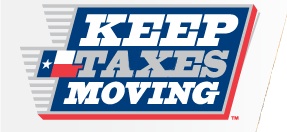"For two years now we have held TxDOT at bay. There’s no Corridor through our jurisdiction. We put a 30-mile-hole through the Corridor."
4/4/09
Susan Rigdway Garry
Anti-Corridor/Rail Expansion (ACRE)
Copyright 2008
At its March 30 meeting, the Coupland Civic Organization heard a presentation from Dan Byfield, president of the American Land Foundation, a national property rights organization. Along with his wife Margaret, who founded another property rights group Stewards of the Range, Byfield was instrumental in forming the “391 Commissions” in Texas to fight the Trans-Texas Corridor.
The first “391” was founded in 2007 in Bell County—the East Central Texas Sub-Regional Planning Commission (ECTSRPC). One of its members is the City of Holland, and also speaking at the meeting were Mae Smith, mayor of Holland and president of the ECTSRPC, and Ralph Snyder, a Holland businessman and a director of the ECTSRPC. Snyder and his wife Marcia helped found the ECTSRPC.
Coordination
Byfield recounted that two-and-a-half years ago, he discovered a requirement in a Texas statute that TxDOT and other state agencies must “coordinate” their planning with local planning commissions. The requirement is in Chapter 391 of the Texas Local Government Code, hence, the name “391 Commissions.” He said, “I told Ralph we needed to start a commission. Ralph started meeting with officials in his area [eastern Bell County], formed the commission, and state agencies started coordinating with this commission.”
There must be two incorporated cities, two counties, or one city and one county to start a “391,” and then other entities such as school districts can join. The ECTSRPC began with Holland, Bartlett, Little River-Academy, and Rogers and then added their school districts.
TxDOT at bay--environmental process
Byfield said, “For two years now we have held TxDOT at bay. There’s no Corridor through our jurisdiction. We put a 30-mile-hole through the Corridor; they’re not going to build a road with a 30-mile gap.” The ECTRPC and Buckholts residents became concerned that TxDOT might bypass Bell County by going farther east through Buckholts, so Buckholts joined the ECTRPC, thus gaining its protection.
The ECTSRPC has stopped the Corridor through the environmental process. TxDOT cannot proceed until the Final Environmental Impact Statement (FEIS) for Tier 1 is out. Snyder said, “There were 26 items that TxDOT was obligated to do that they didn’t do. We asked for a supplement to cover these items.”
The ECTSRPC made a formal demand that TxDOT stop the development of the Corridor and restudy it in a supplemental environmental study. The FEIS is still at the Federal Highway Administration, and Snyder says, “If they don’t approve it in the next couple of months, they have to start over.”
Mayor Smith and Ralph Snyder on Texas T-bone high-speed rail
Mayor Smith asked, “Why destroy the Blackland that you cannot replace? Stand up for your land! A statute is on the books that they have to listen to us. When we call, they come to Holland, Texas. We are 45 percent of Bell County.”
She also is concerned about the latest high-speed rail proposal, which is called the Texas T-Bone. A line will run through the state north to south, with a line coming toward it from Bryan that “T’s” into the north-south line in the Temple area. This line would damage the rural areas of Bell County represented by the ECTSRPC.
About high-speed rail, Snyder asked, “Who gets to pay for the planning, for the studies, for the state’s loan to foreign companies, for the decreased value of land on each side of it? We do!”
The ECTSRPC asked for our support in their fight against high-speed rail. They appreciated that the Coupland area had fought the previous high-speed rail proposal, and also that we were among the early opponents of the Corridor.
Legislative attempts to abolish "391's"
About possible attempts in the Legislature to abolish the “391’s,” Byfield said, “There is coordination language in federal statute as well. The National Environmental Policy Act has coordination in it.” Also, he believes the state “can’t do away with the statute because the COG’s [Councils of Government] were created under it.”
To form a Sub-Regional Planning Commission, the cities and counties must be in the same Council of Government. Williamson is not in the COG with Bell County; it is in the Capital Area COG, along with the counties of Bastrop, Blanco, Burnet, Caldwell, Fayette, Hays, Lee, Llano, and Travis.
Eminent domain
Regarding eminent domain in this legislative session, Byfield said there are eight bills and three constitutional amendments filed. He said there are some “good bills, supported by the Texas Farm Bureau, but they aren’t supported by the governor. We don’t know that we will see good legislation. This session is very important for rural Texas.”
Supporting "391's"
The speakers were asked, since Coupland is not incorporated, how we can participate in the Sub-Regional Planning Commission process. Snyder mentioned supporting the American Land Foundation and Stewards of the Range: “These two foundations operate on donations.” Mayor Smith added, “Support the commissions that are out there.” Currently, there are nine in Texas. News and descriptions of all of them are at www.391texas.blogspot.com
Attendees were given copies of Standing Ground, the publication of Stewards of the Range and American Land Foundation. You can view it online at www.stewards.us. The site of American Land Foundation is www.amland.us
© 2009 ACRE: acretexas.blogspot.com
To search TTC News Archives click
To view the Trans-Texas Corridor Blog click









